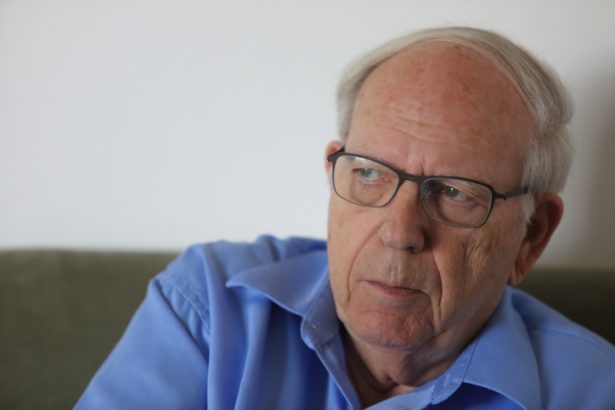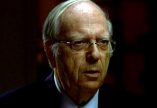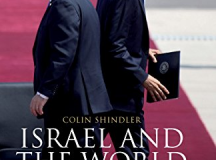Former head of Mossad Efraim Halevy presents a sweeping overview of Israel’s strategic situation. He argues that the desire in both US political parties to pivot away from the region, coinciding with the equally strong desire of Russia to return to the Middle East as a status-hungry great power will have significant long-term consequences for Israel and for the peace process. ‘Trump will be unable to close a deal without President Putin on board,’ says Halevy, so while a joint American-Russian peace plan (or at least one signed off by Putin) for the Israeli-Palestinian conflict may seem outlandish, it may also be the only prospect in town.
1948 and the Czech rifle
In 1948 the US imposed a wide sweeping arms embargo on the entire Middle East, although Israel was the only true victim of this shameful act. This embargo was effectively enforced and were it not for the critical supplies of light arms and ammunition provided by the Communist Bloc led by the Soviet Union, victory might well have eluded the nascent state with truly disastrous consequences. There were days when the fighters who fought under Harel battalion commander Yitzhak Rabin had only 20 bullets left in their belts. The so-called ‘Czech’ rifle became one of the symbols of our War of Independence. It was augmented by a smaller quantity of heavier arms and even a few light aircraft.
The hard fought victory of 1948 was achieved against all odds – so many military figures and statesmen in the international community gave the six hundred thousand Jews in the Holy Land less than 50 per cent chance of survival against the combined forces of Egypt invading from the south, the Arab Legion of the Hashemite Kingdom of Jordan and the Iraqi Armed Forces marching into Palestine from the east, and the Syrians and Palestinian elements coming down from the north. Added to all that were the armed groups of Palestinians, who harassed and attacked Jewish towns and settlements, causing many civilian deaths and casualties.
The decision to go ahead and declare a ‘state’ was a subject of heated debate in the then ten-man leadership of the Jewish Yishuv (the Jewish community in Palestine). There were moments when there was a tie and it took David Ben-Gurion all the power he could summon to break it.
In addition to that there were three armed groups operating inside the Jewish Yishuv. One was the Haganah with its elite crack unit – the Palmach – representing the mainstream of the population. Besides it was the ‘Irgun Zvai Leumi,’ the Etsel, mainly based on the revisionist wing of the Zionist national movement, and ‘Lohamei Herut Yisrael,’ which had split away from the Etsel and propagated an even more extreme policy against the British presence during the Mandate.
Against such a backdrop of internal armed dissension, the choice Ben-Gurion had to make was not only a brave one but a grim one. At one stage of the run up to ‘Declaration Day’ the ten-man leadership group he chaired was in favour of postponement by a six to four majority. Ultimately, it was a six to four decision to go ahead.
On the international scene, officials in Washington doubted a Jewish success in a military confrontation with the Arab world. None other than a five star General, Secretary of State George Marshall pressed hard to replace the 1947 UN decision for statehood with a UN trusteeship transitory solution. He wanted to avoid an impending defeat that he thought would annihilate the Jewish community – a second mini Holocaust.
Russia expected practical recognition of its policy by fledgling Israel on both the Middle East and international scenes. It became bitterly disappointed when Israel aligned itself with the free world as opposed to the communist bloc. There followed over 40 years of successive wars in which Israel had to contend with large armies equipped with constantly upgraded Soviet equipment.
2018: Israel faces a radically new strategic scene
Seventy years after the War of Independence, the entire strategic scene as viewed from Jerusalem has undergone a radical change. Of the seven states that went to war with Israel in 1948 two have subsequently signed peace treaties with us and currently share key interests with Israel in combatting Islamic terror and Iranian imperialist activities throughout the Middle East. And of all the other armies and states that challenged newly born Israel in 1948 little remains in the field. Iraq, Syria and Lebanon have become ‘failed states’ while the rest (Yemen, Sudan and Saudi Arabia) are of no military consequence today in terms of threatening Israel.
In reviewing Israel’s strategic situation in 2018, three developments stand out.
For now, the loss of non-Arab allies
First, the original challengers have either made peace with Israel or their strategic significance has been radically diminished. The strategy that was constructed to counterbalance virtual isolation – to focus on the ‘periphery’ – has become outdated to say the least. Over the first 30 years of Israel’s existence secular Turkey and the Iran of the Shah were Israel’s closest regional allies. This ‘triangle’ was even partially formalised and all three partners were equal beneficiaries. How ironic that today they are strategic adversaries entirely due to internal developments in Tehran and Ankara. One should not despair that in the future the triangle will emerge once again because the basic national secular interests of Turkey and Iran and Israel still complement each other.
The rise of dangerous non-state actors
A second change that has the most serious consequences is the appearance of two non-state actors – Hezbollah and Hamas – who have evolved into the two current and immediate threats and have clashed swords with Israel over the quarter of a century in a variety of formats. Israel’s steady message to the public has been that the two have been and are currently ‘deterred’. While a prolonged policy of deterrence, interlaced with periodic confrontations extending over weeks, sometimes leads to a conclusion that neither side has any real appetite to ‘go for the jugular,’ the term ‘mutual deterrence’ is the better description of the current state of affairs.
Given the semi-permanent or permanent existence of these non-state actors in the region, it has been logical to assume that the major global actors who are present and active in Middle East affairs would seek and even maintain contacts with them. Some of these contacts have assumed confidential and at times indirect forms while others are more open and formal and attest to the enhanced status of those involved.
Surprisingly it is Hamas – the weaker of the two non-state actors on Israel’s borders – that has decided when and for what pretext a round of confrontation with Israel is timely. Israel has stuck to its ‘non-policy posture’ and has confined itself to preserving the status quo rather than either trying to negotiate for an extended long term hudna (ceasefire) or routing the enemy and destroying its military capability once and for all. Since neither prospect is desirable, Israel has to commit its best infantry and armoured units to maintaining the status quo. At the same time, over the long term, such ‘non-policy’ damages Israel’s image of invincibility, which represents a significantly heavy price to pay for a major Middle Eastern power as it enters its eighth decade.
US out, Russia in?
The third shift in the strategic scene is the desire in both US political parties to pivot away from, or to reduce its footprint in the region, coinciding with the equally strong desire of Russia to return to the Middle East as a status-hungry great power.
Ever since the 1967 Six-Day War, successive Israeli and American administrations have viewed their relationship as being based on both shared values and shared strategic and security interests. When Ben-Gurion met with the American leadership in 1951 he affirmed Israel’s partnership with the ‘free world’ with all that this might entail. Today, looking back, Israel has received military and economic aid that surpasses $100bn and the American contribution to Israel’s security entails a commitment to preserve its ‘qualitative edge’ in the region. This latter term covers much that can be said and much that is better left unsaid. Israel’s defence and security still relies on the continuation of this commitment.
And yet it is essential for Israel to realise that the translation of these commitments into action at any given moment will depend upon the way the political level interprets them in real time. There have been and can always be differences in perceptions between Jerusalem and Washington on concrete issues. The devil lies not in the realm of major policy declarations that ‘America will have Israel’s back,’ but rather in the details of decisions required almost on the spur of the moment (such as the decision during the 1973 war on whether to airlift arms to Israel – which was delayed by several days – or the 2007 discussion over whether to bomb the Syrian nuclear reactor, which President George W. Bush ultimately decided against, leaving it to Israel to do the job).
An analysis of Russia’s approach to its relations with Israel calls for a more detailed approach. After Russia’s initial support during the War of Independence, Israel and the Soviet Union parted ways until 1991. After Russia severed diplomatic relations there were no overt relations between the two countries. In the Yom Kippur war of 1973 Moscow came the nearest it ever got to delivering victory to Egypt and Syria. Because of its supply of military equipment, by the end of the first week of that war a third of Israel combat aircraft had been downed and a major part of its armoured capability destroyed. The response of Washington to Israel’s needs was slightly late in coming and the outlook appeared grim. Two weeks later the shoe was on the other foot. That began a gradual decline in Russian influence in the Middle East.
Not only did the Israeli victory over Egypt and Syria ensure its future; Russian clients in the region now began to look westward to Washington. Egypt secured the US as a replacement to Moscow in military procurement and even Hafez Assad tried to gain favour in Washington for Syria. While Moscow reached the conclusion in 1972 that it was at a disadvantage internationally because it had no contact with Israel, it was only following the Yom Kippur War (whose results were disastrous for Russia) that it realised the importance of establishing a serious channel to exchange views as it afforded both sides the opportunity to discuss strategic differences at length. Much of what went on during the years that followed was revealed in public by the senior KGB figure who ran this link, Yevgeny Primakov, who subsequently become Head of the SVR (the successor to the foreign wing of the KGB) as well as foreign minister and later prime minister of Russia before Vladimir Putin took over. His book Russia and the Arabs contains 50 pages devoted to the Israeli link with Primakov meeting all the prime ministers of Israel between 1972 and 1996: Golda Meir, Yitzhak Rabin, Menachem Begin, Yitzhak Shamir and Benjamin Netanyahu.
The meetings with Primakov and his successors were mostly not concerned with practical matters. Rather they served as opportunities to inform the interlocutors on major issues of policy and to influence policy of the other side when possible. Primakov’s book is a mine of information and detail. It also mentions my name and the code name he claims I used.
Much time during these meetings were consumed by discussing basic approaches. I shall try to summarise what Primakov said and wrote. Russia is a Great Power that is integral to the Middle East. If you take a look at the map you will find that Russia straddles Asia and Europe and reaches parts of the Middle East in the south. It has many millions of Russian nationals who have been part of the region for centuries. Therefore the policy of the US to remove the Soviet Union from the Middle East is doomed to fail and is an act of futility.
Israel appeared to adopt the policy of the US after the Yom Kippur war, to ‘expel’ the Soviet Union from the Middle East. Yet this aim can never be achieved for several reasons. The first is a geographical one – the south of the Soviet Union is part of the Middle East and this geographical fact cannot be changed at anybody’s whim. The second reason is also geographical; the US is several thousand miles from the Middle East, and this cannot be amended by the stroke of a pen. Third, Russia has been interested and directly involved in the area for several hundred years going back at least to the days of Empress Catherine the Great in the 18th century. In the mid-19th century, the son of the Russian Czar travelled to Jerusalem to inaugurate the ‘Russian Compound’ when the US had yet to consolidate itself and was nowhere to be seen in the region. Fourthly, Israel would be ill-advised to assume that come what may, the US will always be around. For self-preservation, it should not turn its back on Moscow.
It is noteworthy that when Primakov died in 2015, President Putin lavished praise on him and delivered a very emotional eulogy at his funeral. Primakov received a funeral with military honours and on another occasion was described by Putin as the ‘Godfather of Russian military intervention in Syria and the nation’s leading Arabist’.
It is in this wider context that the current Russian military presence in Syria needs to be assessed. Russia has not entered the fray of the Syrian civil war for a short visit but is rather there to stay. However, this does not necessarily signify that it will adopt the Iranian agenda for Damascus as if it were its own – despite the special link between the Iranian Revolutionary Guards Corps (IRCG) and Russia as well as the cooperation between the Kremlin and IRGC commander General Qassem Soleimani over Syria. On the other hand it will not necessarily embrace Israel’s demands and conditions in every given situation. What can and should be said is that the Russian position vis-à-vis Israel’s demand to effectively curtail Iranian penetration of Syria will be highly influenced by the determination of Israel to act effectively and clearly against Iranian advances and against any protection these may try to elicit from anyone present in the vicinity. This will require delicate micro-management and risk-taking.
The coming decade will reinforce the roles of the world powers in influencing the march of history involving the local and regional players like Israel, Iran, Egypt and Saudi Arabia. But all eyes will be on Syria where all these players will be pressing to ensure their national interests. Russia will take centre stage and try to drive hard bargains in its dealings with Israel. The most difficult nut to crack will not be the Iranian one but the Palestinian one, which will be made even harder by Russia’s significant relations with Hamas, as reflected by current Foreign Minister Sergei Lavrov meeting politburo chief Khaled Meshaal at different times in recent years (with Lavrov even inviting Meshaal to Moscow).
As Primakov stated after his last meeting with Prime Minister Netanyahu over 20 years ago, Russia will never remove the target of establishing a Palestinian state from the agenda. President Putin has proven he will not renege on this item.
Over the last month, several significant events have occurred whose consequences will take time to be fully understood: Israel dramatically revealed intelligence from Iran’s nuclear programme; President Donald Trump pulled the US out of the JCPOA nuclear agreement; Israel and Iran have escalated their ongoing battle in Syria; tension between Israel and Hamas in Gaza has increased; the US formally moved their embassy to Jerusalem. And while Israel’s prime minister has been honoured in Moscow and praised in Washington, there is no such thing as a free lunch in international politics and it is naïve to think that in Russia interpersonal relations count for more than national interests. When national interests are at stake, if one receives, one needs to subsequently give – with the currency being political and strategic.
Seen from Washington and Moscow at this point in time it’s clear that the Russians have many more Palestinian cards in their deck than the Americans, including numerous channels and contacts to all the relevant stakeholders in both the war zones and diplomatic field. The vacuum of American retrenchment in the Middle East has been filled with Russian prestige and boots on the ground, and it’s clear that without the Russians being on board, any ‘deal of the century’ simply won’t get off the ground. The US alone no longer possesses the clout vis-à-vis the relevant Palestinian stakeholders while the leverage Putin has accumulated far surpasses that of Trump’s. All this means that Trump will be unable to close a deal without President Putin on board and any proposed deal will thus inevitably reflect the national interests of both world powers.
Looking forward, a joint American-Russian peace plan (or at least one signed off by Putin) for the Israeli-Palestinian conflict may be outlandish. But it may also be the only true prospect in town.






































Comments are closed.